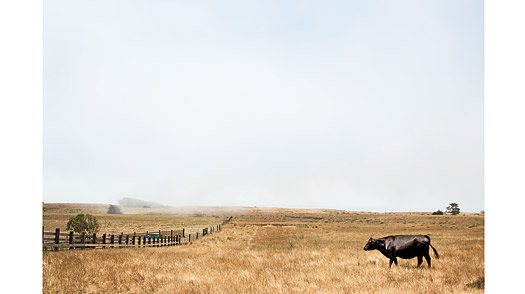
One of more than 100 cattle on Bill Niman's California property, home of an ongoing experiment in sustainable ranching.
(6 of 8)
A transition to more sustainable, smaller-scale production methods could even be possible without a loss in overall yield, as one survey from the University of Michigan suggested, but it would require far more farmworkers than we have today. With unemployment approaching double digits--and things especially grim in impoverished rural areas that have seen populations collapse over the past several decades--that's hardly a bad thing. Work in a CAFO is monotonous and soul-killing, while too many ordinary farmers struggle to make ends meet even as the rest of us pay less for food. Farmers aren't the enemy--and they deserve real help. We've transformed the essential human profession--growing food--into an industry like any other. "We're hurting for job creation, and industrial food has pushed people off the farm," says Hahn Niman. "We need to make farming real employment, because if you do it right, it's enjoyable work."
One model for how the new paradigm could work is Niman Ranch, a larger operation that Bill Niman founded in the 1990s, before he left in 2007. (By his own admission, he's a better farmer than he is a businessman.) The company has knitted together hundreds of small-scale farmers into a network that sells all-natural pork, beef and lamb to retailers and restaurants. In doing so, it leverages economies of scale while letting the farmers take proper care of their land and animals. "We like to think of ourselves as a force for a local-farming community, not as a large corporation," says Jeff Swain, Niman Ranch's CEO.
Other examples include the Mexican-fast-food chain Chipotle, which now sources its pork from Niman Ranch and gets its other meats and much of its beans from natural and organic sources. It's part of a commitment that Chipotle founder Steve Ells made years ago, not just because sustainable ingredients were better for the planet but because they tasted better too--a philosophy he calls Food with Integrity. It's not cheap for Chipotle--food makes up more than 32% of its costs, the highest in the fast-food industry. But to Ells, the taste more than compensates, and Chipotle's higher prices haven't stopped the company's rapid growth, from 16 stores in 1998 to over 900 today. "We put a lot of energy into finding farmers who are committed to raising better food," says Ells.
Bon Appétit Food Management, a caterer based in Palo Alto, Calif., takes that commitment even further. The company sources as much of its produce as possible from within 150 miles of its kitchens and gets its meat from farmers who eschew antibiotics. Bon Appétit also tries to influence its customers' habits by nudging them toward greener choices. That includes campaigns to reduce food waste, in part by encouraging servers at its kitchens to offer smaller, more manageable portions. (The USDA estimates that Americans throw out 14% of the food we buy, which means that much of our record-breaking harvests ends up in the garbage.) And Bon Appétit supports a low-carbon diet, one that uses less meat and dairy, since both have a greater carbon footprint than fruit, vegetables and grain. The success of the overall operation demonstrates that sustainable food can work at an institutional scale bigger than an élite restaurant, a small market or a gourmet's kitchen--provided customers support it. "Ultimately it's going to be consumer demand that will cause change, not Washington," says Fedele Bauccio, Bon Appétit's co-founder.
